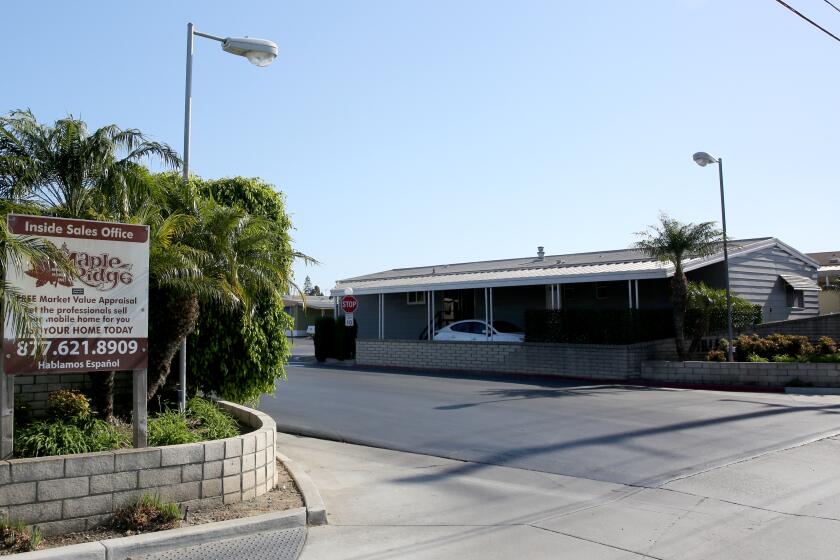Medi-Cal scare
- Share via
Jenny Marder
Gerry Bowes, 82, and her husband, Carl Schlismann, 86, get by on
Social Security, Medi-Cal and the meager income from Bowes’ part-time
job selling Avon. The couple has no family and no one to support them
financially.
Bowes fears for her husband, who will have nowhere to go if
Medi-Cal cuts force him out of the care unit of his nursing home. She
can’t hold down the job forever.
A new study crafted by California United for Nursing Home Care, a
nonprofit group working to protect nursing home residents, found that
the 15% cuts, outlined in Gov. Gray Davis’ May revision for the
proposed 2003-04 budget, could result in the closure of 11 homes in
Orange County and 250 to 300 nursing homes statewide.
Proposed cuts to Medi-Cal for nursing homes could have devastating
effects on Huntington Beach facilities, possibly forcing some to shut
down, said Fernando Rodriguez, corporate administrator of Sunbridge
Care Center in Huntington Beach, where Schlismann is cared for.
“To live off of Medi-Cal funding is very, very difficult,” Bowes
said. “I’ve noticed some people who don’t have anybody. There’s
nobody to take care of them. They wouldn’t know what to do.”
There are three nursing homes in Huntington Beach -- Beachside
Nursing and Rehab Center, Sunbridge Care Center and Huntington Valley
Healthcare Center. All three rely on Medi-Cal funding.
“All three would be susceptible to potential closure based on the
cuts,” said Scott Mann, a spokesman for California United for Nursing
Home Care.
The Intermediate Care Facility Unit, where Schlismann lives, could
be one of the casualties of the cuts, as the unit is strictly
Medi-Cal funded, said Rebecca Mangoal, interim administrator for the
unit.
If the cuts are made, Sunbridge might not be able to pay for the
unit and would have to find somewhere to relocate the patients.
“This would mean putting the burden back on the family,” Mangoal
said. “It’s not a pretty picture.”
Sunbridge has 280 beds and a staff of 200.
“Most nursing homes in Huntington Beach have a very difficult time
keeping their doors open,” Rodriguez said. “It’s not like we have a
lot of revenue coming in now. I don’t want to be a doomsayer, but
something’s got to give somewhere.”
The give, he said, could mean having to refuse patients who
require more expensive care and making staffing cuts.
“For some of the [caregivers], they would potentially lose a job
or look at a cut in salary,” Mann said.
Medi-Cal is a need-based program funded jointly by the state and
federal government. To qualify, a resident must have an annual income
of less than $2,000 a month. Some of those who qualify for Medi-Cal
are people 65 or older, blind or disabled people and pregnant women.
Displaced residents would have no choice but to turn to hospital
care, which is five to 10 times more expensive than an average
nursing home, Rodriguez said.
“What [state legislators] are not taking into consideration is the
fact that workers comp and liability insurance has skyrocketed,” he
said. “Couple that with Medi-Cal cuts, and you have a recipe for
disaster.”
Nursing home administrators and senior advocacy groups are pushing
to convince legislators to halt the cuts. Bowes wrote a letter to
Congressman Dana Rohrabacher asking him to prevent the Medi-Cal cuts.
“Our biggest push now is we’re trying to meet the legislature to
make them understand that this is an inappropriate direction,”
Rodriguez said. “You just can’t cut funding to seniors. It’s
inappropriate.”
The Medi-Cal cuts would go into effect Oct. 1.
* JENNY MARDER covers City Hall. She can be reached at (714)
965-7173 or by e-mail at [email protected].
All the latest on Orange County from Orange County.
Get our free TimesOC newsletter.
You may occasionally receive promotional content from the Daily Pilot.



